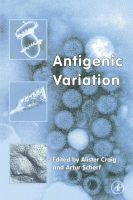Browse content
Table of contents
Actions for selected chapters
- Full text access
- Book chapterAbstract only
1 - Mechanisms of Antigenic Variation: An Overview
Piet Borst
Pages 1-15 - Book chapterAbstract only
2 - HIV Variation—A Question of Signal-to-Noise
Simon Wain-Hobson
Pages 16-32 - Book chapterAbstract only
3 - Calicivirus
Alan D. Radford, Susan Dawson and Rosalind M. Gaskell
Pages 33-51 - Book chapterAbstract only
4 - Influenza — The Chameleon Virus
John Oxford, Ramani Eswarasaran, ... Robert Lambkin
Pages 52-83 - Book chapterAbstract only
5 - Rotavirus
C. Anthony Hart and Nigel A. Cunliffe
Pages 84-101 - Book chapterAbstract only
6 - Haemophilus Influenzae
Derek W. Hood and E. Richard Moxon
Pages 102-121 - Book chapterAbstract only
7 - Phase Variation in Helicobacter Pylori Lipopolysaccharide
Ben J. Appelmelk and Christina M.J.E. Vandenbrouck-Grauls
Pages 122-141 - Book chapterAbstract only
8 - Genetic Variation in the Pathogenic Neisseria Species
Thomas F. Meyer and Stuart A. Hill
Pages 142-164 - Book chapterAbstract only
9 - Candida Albicans
David R. Soll
Pages 165-201 - Book chapterAbstract only
10 - The MSG Gene Family and Antigenic Variation in the Fungus Pneumocystis Carinii
James R. Stringer
Pages 202-223 - Book chapterAbstract only
11 - Trypanosome Antigenic Variation—A Heavy Investment in the Evasion of Immunity
J. David Barry and Richard McCulloch
Pages 224-242 - Book chapterAbstract only
12 - Antigenic Variation in Anaplasma Marginale and Ehrlichia (Cowdria) Ruminantium
Suman M. Mahan
Pages 243-272 - Book chapterAbstract only
13 - Antigenic Variation and its Significance to Babesia
David R. Allred, Basima Al-Khedery and Roberta M. O'Connor
Pages 273-290 - Book chapterAbstract only
14 - Antigenic Variation in Plasmodium falciparum and Other Plasmodium Species
Mallika Kaviratne, Victor Fernandez, ... Peter R. Preiser
Pages 291-318 - Book chapterAbstract only
15 - Antigenic Variation in Borrelia: Relapsing Fever and Lyme Borreliosis
Alan G. Barbour
Pages 319-356 - Book chapterAbstract only
16 - Surface Antigenic Variation in Giardia Lamblia
Theodore E. Nash
Pages 357-374 - Book chapterAbstract only
17 - Free-living and Parasitic Ciliates
Theodore G. Clark and James D. Forney
Pages 375-402 - Book chapterAbstract only
18 - The Impact of Antigenic Variation on Pathogen Population Structure, Fitness and Dynamics
Neil M. Ferguson and Alison P. Galvani
Pages 403-432 - Book chapterNo access
Index
Pages 433-443
About the book
Description
The topic of antigenic variation is important in both biology and medicine. It is of enormous interest, as it describes the process(es) whereby microorganisms 'shift shape', by genetic rearrangement or otherwise. In medical terms, this has a major impact on the infectious disease process, since the immune system has great difficulty in keeping up with this variation, and thus eliminating the infectious agent. Antigenic variation is a major method by which microbes evade the immune response, and persist in the body.
The broad scope of the book appeals to all those working in the field of infectious disease, immunology of infection, pathogenesis, molecular biology and also to evolutionary biologists. Topics covered include not only bacterial species, and viruses such as influenza, HIV, Rotavirus, but also eukaryotic parasites - one of the most fascinating groups of organisms exhibiting this behaviour.
The topic of antigenic variation is important in both biology and medicine. It is of enormous interest, as it describes the process(es) whereby microorganisms 'shift shape', by genetic rearrangement or otherwise. In medical terms, this has a major impact on the infectious disease process, since the immune system has great difficulty in keeping up with this variation, and thus eliminating the infectious agent. Antigenic variation is a major method by which microbes evade the immune response, and persist in the body.
The broad scope of the book appeals to all those working in the field of infectious disease, immunology of infection, pathogenesis, molecular biology and also to evolutionary biologists. Topics covered include not only bacterial species, and viruses such as influenza, HIV, Rotavirus, but also eukaryotic parasites - one of the most fascinating groups of organisms exhibiting this behaviour.
Key Features
Comprehensive coverage of antigenic variation from viruses to parasites
Discussions devoted to molecular mechanisms of host evasion
Detailed descriptions of host/pathogen interactions
Comprehensive coverage of antigenic variation from viruses to parasites
Discussions devoted to molecular mechanisms of host evasion
Detailed descriptions of host/pathogen interactions
Details
ISBN
978-0-12-194851-1
Language
English
Published
2003
Copyright
Copyright © 2003 Elsevier Ltd. All rights reserved
Imprint
Academic Press
